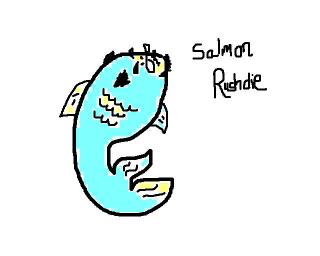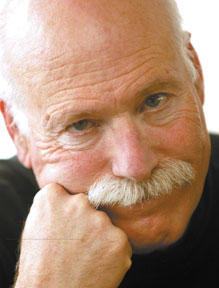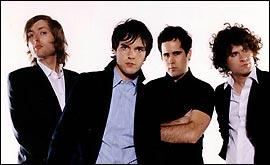No one’s afraid of Tobias Wolff.
He told us how Wolff had now joined a galaxy of famous writers who had visited RWU. He then named Salmon Rushdie. Name familiar yes? I thought so too. In fact, so sure was I of a resemblance, that I drew a possible portrait [like when policemen ask you to identify the bank robber from memory]. Here it is:

Right. Then Nirschel went on to describe Wolff, the man: his life, his jack-of-all-trades existence, which apparently included him being a parrot-trooper. I wondered at this new animal-- what could it possibly look like? Since the same notepad was in front of me, the fingers came up with the following:

Of course, Nirschel may have meant what he said in all good faith. I however, have my suspicions. Parrots tell fortunes. They dont jump off planes, yes? But then Nirschel is from New England. And everyone speaks...erm.. different.
The good thing is that with no further ado, the Wolff was brought on stage. What I love about living writers is that they look exactly like their pictures-- Ol' Bill Shakespeare for instance, probably in all good faith, wore a blonde toupeé. But how can he argue against a hundred paintings and postcards?
Yup. So Wolff looks exactly like this:

I was all prepared to sniff at this shining-pate-in-black-polo person. I had read his book, and though I recognized a pleasant read, I was unimpressed at the fact he called it a work of fiction and yet it sounded more like "creative non-fiction"-- a term broadly used to describe those stories where plot and characters are entirely non fictional, and where names are changed to protect privacy.
[And where there is more sex, and nods of recognition in the local grocery store than actually happened. Thats the creative part. But I digress]
In spite of all my mumbling, I sat there with pen and pad-- as you can tell-- waiting to hear what this man had to say.
He first said he applauded the common reading program, as it gave students a common language with which to communicate with during the first couple of days as freshmen.
Ahem.
The common words of communication thanks to the book were-- "Dude, did you get through that book?" "whacked, man. See ya at lunch".
Sure he was happy about common reading. His book was chosen, sales boosted, et al... but someone shut the cynic up. There were more important things he said.
Like how he wouldn't read from his novel.
Ave, Wolff.
He did however, go on to talk about the how and why of writing his book.
He opened by mentioned Frost's Road not Taken. He calmly went on to disclaim the theory that the poem is a celebration of individual choice, the riding of the rough path towards hard-worn success. He said, no-- see how Frost says 'the passing there/ had worn them really about the same'? He's saying both paths were similar. I quote Wolff: the famous last lines [I took the one less travelled by/and that has made all the difference] are "...about the lies he's going to be telling later on".
Go Wolffy.
Wolff's point was that when we--especially writers-- look back on our lives, we tend to dignify it, give it meaning beyond what it had at the time. And that's the danger in writing from one's own memory.
Wolff laid great emphasis on what he read as a child. Which consisted of books about Collies by a man named Albert Payson Terhune. Wolff told of a storyline that included a dog finding his way from Jersey to France to save his wounded master in WWII...
Ahem. No, the fingers froze in shock, nothing was doodled.
Certifiable, Wolff jokingly said. The audience half-laughed along with him, gazing at him in disbelief. He quickly brought them back by saying:
"The one great influence is the book that kept you up as a kid-- Sticking a towel underneath the door to hide the fact you were awake from your parents".
He had them back in his pocket with that one.
Wolff used to write vast amounts of stories-- Whenever his classmates needed to turn in a story, he would give them one of his. Yes, the teacher noticed once. Gave a classmate a C for one such story, a thing Wolff was told 30 years later. He said he still felt hurt because of that. When he asked why the C, his classmate told him that the teacher has said yes the story deserves an A: but it's Jack Wolff's story, not yours.
Wolff then smiled, crossed his arms and said he felt pride hearing that, even after all these years. Human, this bald pink trim man in a black polo.
He then made two interesting points about the craft:
1. Imitation is usually spoken of derogatorily. However, it is through imitation that we learn our basic skills; in the same way do we sharpen our writing skills.
He mentioned how Louis Armstrong was brilliant because of endless rehearsal and study [he pronounces it it looiss, not louie as in jungle book, which made me grin. Damn yankees]. He claimed Tolstoy, Hemingway and the collie dog man as influences.
2. He claims to infuse real life into fiction, to give it "spiritual geography"; he feels it fills out the story. Which is as good an argument as I've ever heard for the case of drawing on personal experience to write a story. He called it the melding of the personal with the imagination. He said, "scrutiny of one's life can take you to strange places". And then he quoted Eliot saying-
And the end of all our exploring~T. S. Eliot
Will be to arrive where we started
And know the place for the first time.
[Four Quarters, Little Gidding, pt. 5.]
The audience filed out, waiting for the shining head to appear in the conference room and autograph books for 30mins. I walked away, the Who bashing it out on my ear drums.
Aye, Eliot. Aye, Wolff. You go your way, and I will go mine. As we all will.


